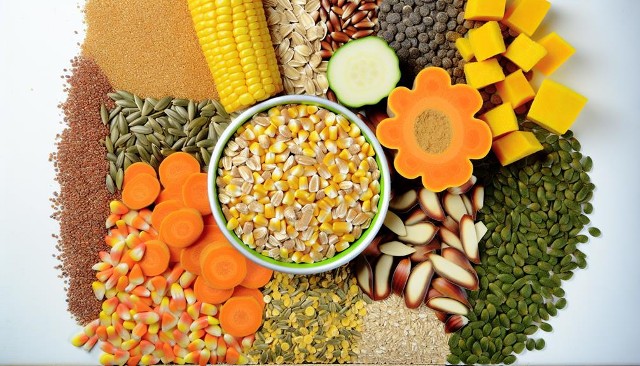Are your chickens not producing as many eggs as you would like? Have you noticed a decrease in their overall health and vitality? Perhaps it’s time to take a closer look at their diet.
You may be surprised to learn that the type of feed you provide for your feathered friends can have a significant impact on their well-being. In fact, a recent study conducted by the University of Agriculture found that chickens who were fed a balanced and high-quality diet not only laid more eggs but also had stronger immune systems.
So, if you’re looking to unlock the potential of your flock and ensure their optimal health, keep reading to discover the ultimate guide to selecting the best chicken feed.
Understanding Chicken Nutritional Needs
To ensure optimal health and productivity, it’s crucial to understand the specific nutritional needs of your chickens. Providing the right balance of nutrients is essential for their growth, egg production, and overall well-being. Chicken feed formulation plays a vital role in meeting these requirements.
A well-formulated chicken feed should contain the right combination of proteins, carbohydrates, fats, vitamins, and minerals. Proteins are crucial for muscle development and egg production, while carbohydrates and fats provide energy. Vitamins and minerals are necessary for various metabolic functions and to prevent common nutritional deficiencies in chickens.
Common nutritional deficiencies in chickens include lack of calcium, phosphorus, and vitamin D3. Calcium is essential for strong eggshells and bone development. Phosphorus aids in energy metabolism and bone formation. Vitamin D3 promotes calcium absorption and utilization.
To address these deficiencies, chicken feeds are often supplemented with specific ingredients. For example, oyster shell or limestone is added to increase calcium levels, while fish meal or bone meal is included to provide phosphorus. Vitamin D3 can be obtained through sunlight exposure or added directly to the feed.
Understanding the specific nutritional needs of your chickens and ensuring a well-formulated feed will help prevent deficiencies and promote optimal health and productivity.
Evaluating Different Types of Chicken Feed
Understanding the nutritional needs of your chickens is the foundation for evaluating different types of chicken feed and selecting the best option for their health and productivity. When evaluating feed ingredients, it’s important to consider the protein content, vitamins, minerals, and energy provided by each ingredient.
Protein is crucial for muscle development and egg production, so look for feeds with a balanced protein profile. Vitamins and minerals are essential for overall health and egg quality, so ensure that the feed contains a suitable blend of these nutrients.
In addition to evaluating feed ingredients, comparing different feed brands can also help you make an informed decision. Look for brands that have a good reputation and have been recommended by experienced chicken farmers. Consider the brand’s track record, customer reviews, and their commitment to quality and safety. Check if the brand follows industry standards and regulations to ensure that the feed is free from contaminants and safe for consumption.
Furthermore, consider the price and availability of the feed. While it’s important to provide your chickens with high-quality feed, it’s also necessary to find a feed that fits within your budget. Compare prices and availability from different suppliers to ensure that you’re getting the best value for your money.
Factors to Consider When Selecting Chicken Feed
When selecting chicken feed, it’s important to consider several factors that will ensure the health and productivity of your flock. One of the first factors to consider is the ingredients in the chicken feed. Look for feeds that contain a balanced mix of proteins, carbohydrates, fats, vitamins, and minerals. Proteins are essential for muscle development and egg production, while carbohydrates provide energy. Fats are important for maintaining feather health and insulation. Vitamins and minerals play a crucial role in promoting overall health and preventing deficiencies.
Another factor to consider is the choice between organic and conventional chicken feed. Organic chicken feed is made from ingredients that have been grown without the use of synthetic pesticides, fertilizers, or genetically modified organisms. It’s also free from antibiotics and growth hormones. Organic feed is a good choice if you’re looking to produce organic eggs or meat.
On the other hand, conventional chicken feed is made from ingredients that may have been treated with synthetic pesticides or fertilizers. It may also contain antibiotics or growth hormones. Conventional feed is often less expensive than organic feed, but it may not meet the standards of organic poultry production.
Tips for Reading Chicken Feed Labels
Consider the following tips to effectively navigate and understand the information provided on chicken feed labels.
Interpreting ingredient lists is crucial in determining feed quality. Start by examining the first few ingredients listed on the label, as they make up the majority of the feed content. Look for high-quality protein sources such as soybean meal or fishmeal, as these provide essential amino acids necessary for optimal chicken growth and development.
Next, pay attention to the presence of grains and fillers. Corn and wheat are commonly used as energy sources in chicken feed, but excessive amounts can lead to nutrient imbalances. Avoid feeds that contain excessive amounts of fillers, as this can reduce the overall nutritional value.
Furthermore, be cautious of artificial additives and preservatives. While some additives are necessary to maintain feed freshness and prevent spoilage, excessive use of artificial ingredients may be harmful to chickens. Look for feeds that use natural preservatives like vitamin E or rosemary extract instead.
Recommended Chicken Feed Brands and Products
To ensure the best nutrition for your chickens, it’s important to choose from a selection of reputable chicken feed brands and products. When comparing organic and non-organic chicken feed options, it’s essential to understand the differences in ingredients and production methods.
Organic chicken feed is made from ingredients that are grown without the use of synthetic pesticides, fertilizers, or genetically modified organisms (GMOs). It typically includes grains like corn, soybeans, and wheat, along with vitamins and minerals to provide a balanced diet. Non-organic chicken feed, on the other hand, may contain conventionally grown grains that have been treated with pesticides and other chemicals.
In addition to commercial chicken feed, some chicken owners prefer to make their own feed using homemade recipes. Homemade chicken feed allows for greater control over ingredients and can be tailored to meet the specific nutritional needs of your flock. Benefits of homemade chicken feed recipes include the ability to avoid potential allergens or additives, as well as the opportunity to incorporate organic or locally sourced ingredients. However, it’s important to consult with a poultry nutritionist or veterinarian to ensure that your homemade feed provides all the necessary nutrients for your chickens.
When selecting chicken feed brands and products, consider the nutritional requirements of your flock, the availability of organic or non-organic options, and the feasibility of making homemade feed. By choosing a reputable brand or creating your own feed, you can provide your chickens with a well-balanced diet that supports their overall health and productivity.
Frequently Asked Questions
How Often Should I Clean My Chicken Coop?
You should clean your chicken coop regularly to maintain a clean and healthy environment for your chickens. It is necessary to clean the coop in winter as well. Learn how to maintain a clean coop without using chemicals in our guide.
What Is the Best Way to Store Chicken Feed to Ensure Its Freshness?
To ensure freshness, store chicken feed properly to prevent moisture and pests. Different types of containers have pros and cons. Use airtight bins to keep feed dry and secure, or metal containers for durability and rodent resistance.
Can I Feed My Chickens Table Scraps or Leftovers Instead of Commercial Chicken Feed?
You can feed your chickens table scraps or leftovers instead of commercial chicken feed, but there are pros and cons to consider. Table scraps can provide variety, but may lack necessary nutrients. Explore alternative feed options for a balanced diet.
Are There Any Natural Supplements That Can Be Added to Chicken Feed to Boost Their Immune System?
Boost your chickens’ immune system with natural remedies. Herbal supplements, like Echinacea and garlic, can enhance their health and ward off illnesses. Take your flock to the next level of wellness!
How Can I Prevent My Chickens From Overeating or Becoming Obese?
To prevent chicken obesity and manage their appetite, limit their access to food by using a timed feeding schedule. Also, ensure they have plenty of space to roam and exercise. Monitoring their weight regularly is crucial.


